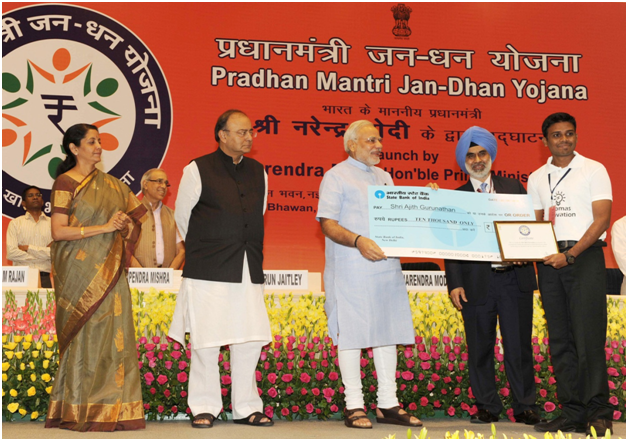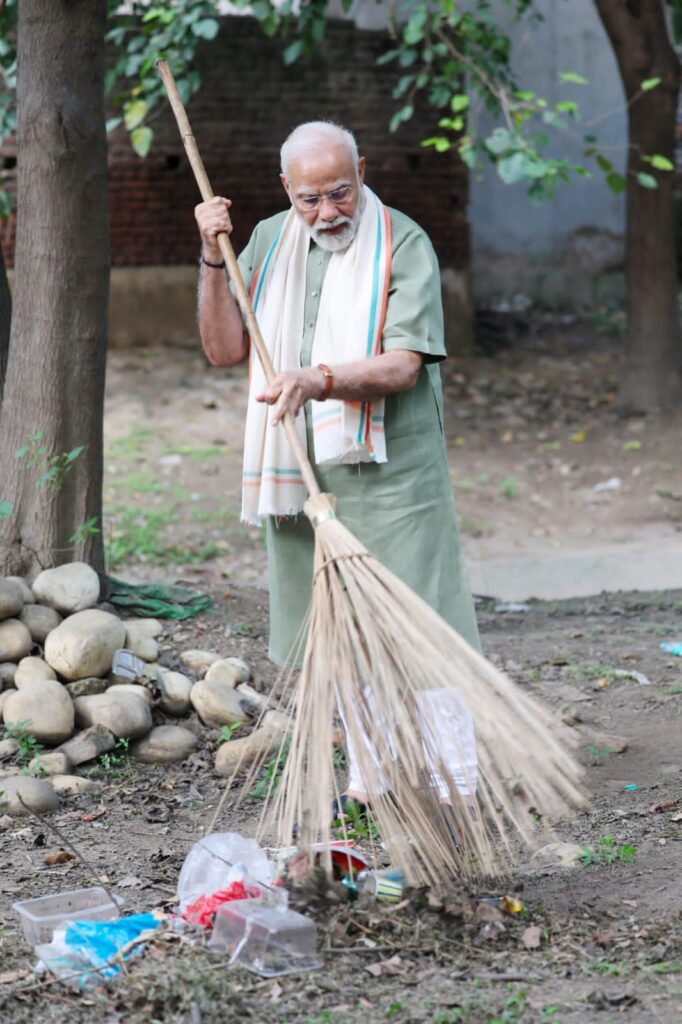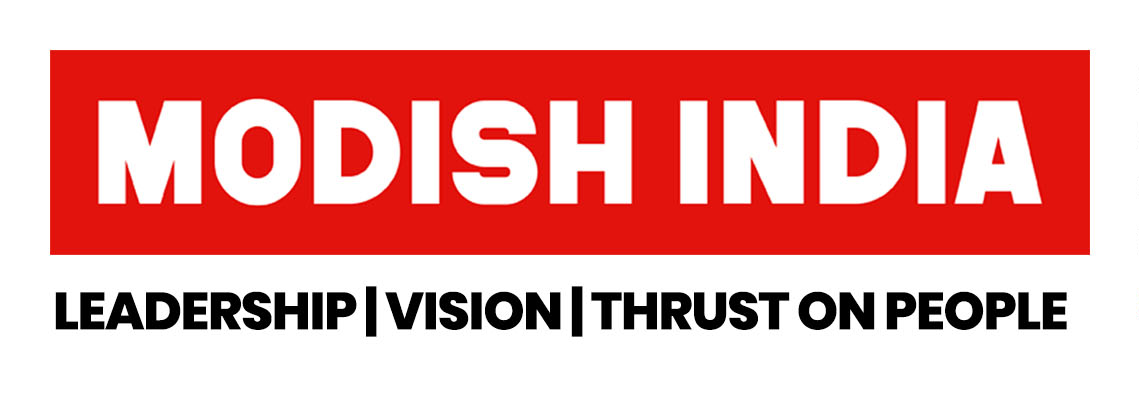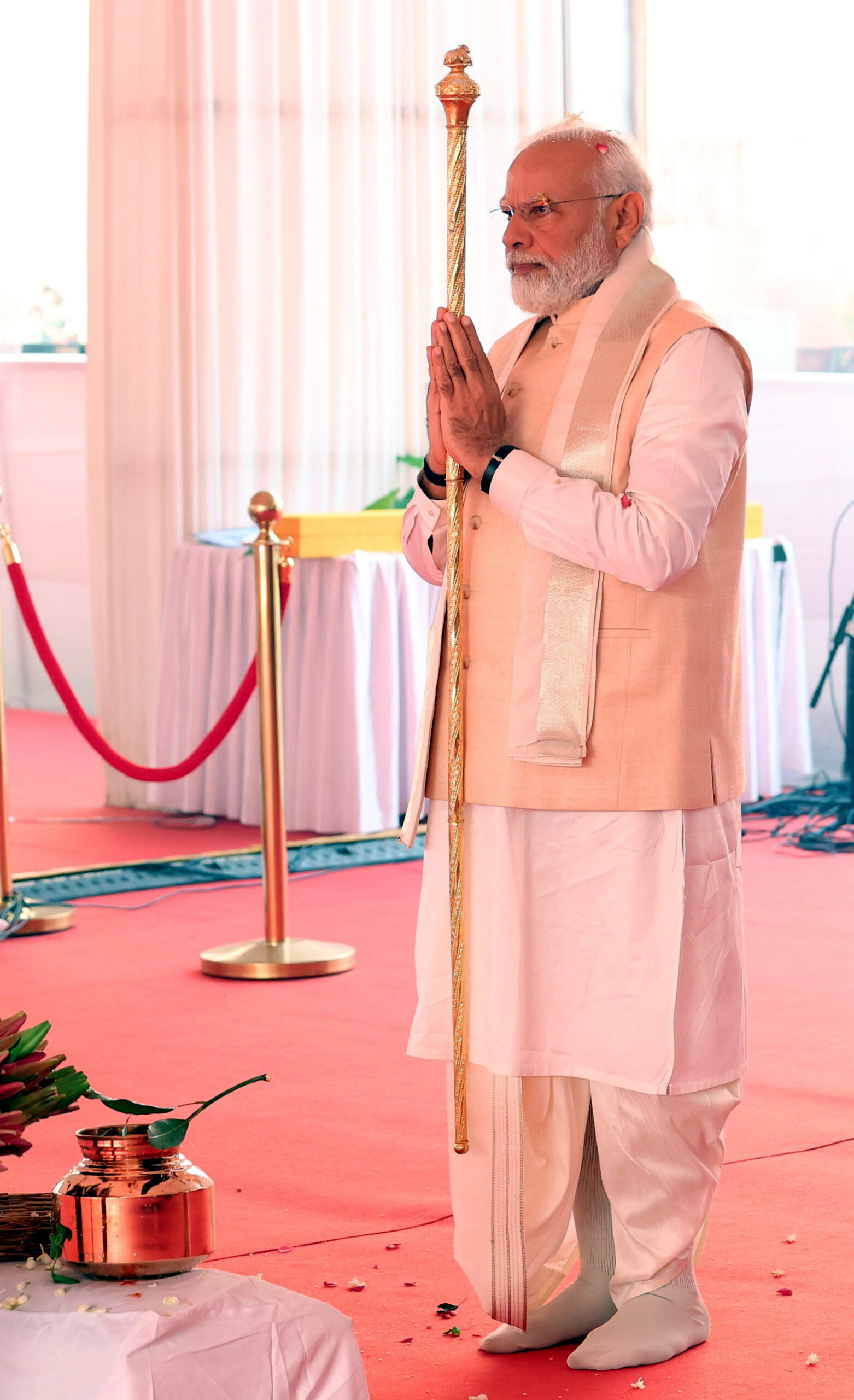
CHANGE ARCHITECT: MODI – INDIA NEW BRAND FOR PEOPLE-CENTRIC TRANSFORMATION
“Narendra Modi is a people’s leader and he is dedicated to solving the problems of the common people and improving their standard of living. There is nothing more satisfying for him than being among people, sharing happiness with them and removing their sorrows.”
Shri Narendra Modi was sworn in as the Prime Minister of India on 30 May 2019, beginning his second term. The first Prime Minister to be born after independence, Mr Modi has previously served as the Prime Minister of India from 2014 to 2019. He has held his position as the Chief Minister of Gujarat for a long period from October 2001 to May 2014.
In the 2014 and 2019 parliamentary elections, the Bharatiya Janata Party, under the leadership of Mr Modi, won an absolute majority on both occasions. The last time a political party won an absolute majority was in the 1984 elections.
Shift in Governance
Inspired by the motto of ‘Sabka Saath, Sabka Vikas, Sabka Vikas’, Shri Modi initiated a paradigm shift in governance and led an inclusive, growth-oriented and corruption-free governance. The Prime Minister has worked at speed and scale to realize the objective of Antyodaya and ensure that the last person in society gets the benefits of the government’s schemes and initiatives.
Elimination of Poverty
Various international agencies acknowledged that under the leadership of Prime Minister Modi, India is eliminating poverty at a record pace. The credit for this goes to various decisions taken by the Central Government keeping in mind the interest of the poor.
Today India is leading the world’s largest healthcare program Ayushman Bharat. Covering over 50 crore Indians, Ayushman Bharat is ensuring high quality and affordable healthcare to the poor and neo-middle class.
Health Sector
Lancet, one of the world’s most prestigious health journals, has praised Ayushman Bharat, saying that the scheme is removing the dissatisfaction related to the health sector in India. The magazine also praised PM Modi’s efforts to prioritize universal health coverage.
Power for Poor
To bring the poor who were away from the financial stream of the country into the financial stream, the Prime Minister launched the Pradhan Mantri Jan Dhan Yojana, the objective of which was to open bank accounts of every Indian. So far, more than 35 crore Jan Dhan accounts have been opened. These accounts not only connected the poor to banks but also opened other avenues of empowerment.
Going one step ahead of Jan-Dhan, Shri Modi laid emphasis on public security by providing insurance and pension cover to the weakest sections of the society. JAM Trinity (Jan Dhan- Aadhaar- Mobile) has eliminated middlemen and ensured transparency and speed through technology.
Social Thrust
More than 42 crore people associated with the unorganized sector now have pension coverage under the Pradhan Mantri Shram Yogi Maan Dhan Yojana. The uniform pension scheme for traders has been announced during the first cabinet meeting after the 2019 election results.
Cooking Gas Connection
Pradhan Mantri Ujjwala Yojana was launched in 2016 to provide free cooking gas connections to the poor. This scheme has proved to be a major step in providing smoke free kitchens to more than 7 crore beneficiaries. Most of its beneficiaries are women.
Even after 70 years of independence, electricity has been provided to 18,000 villages where there was no electricity.
Home For All Indians
Shri Modi believes that no Indian should be homeless and to realize this vision, more than 1.25 crore houses have been built between 2014 and 2019. The pace of house construction has increased to fulfill the Prime Minister’s dream of ‘Housing for All’ by 2022.
Agriculture
Agriculture is a sector which is very close to Shri Narendra Modi. During the interim budget of 2019, the government announced a monetary incentive scheme for farmers in the form of PM Kisan Samman Nidhi. Installments have been paid regularly in approximately 3 weeks after the launch of the scheme on 24 February 2019. During the first cabinet meeting of PM Modi’s second term, it was decided to give the benefit of PM Kisan to all the farmers by removing the limit of 5 acres in this scheme. With this, the Government of India will dedicate approximately Rs 87,000 crore every year for farmer welfare.

Farm Sector
Shri Modi launched various initiatives towards farmer welfare like Soil Health Card, e-NAM for better markets and renewed focus on irrigation. On 30 May 2019, the Prime Minister fulfilled a major promise by creating a new Jal Shakti Ministry to oversee all aspects related to water resources.
‘Swachh Bharat’
On 2 October 2014, on the birth anniversary of Mahatma Gandhi, Prime Minister Modi launched the ‘Swachh Bharat Mission’ to promote cleanliness across the country. This mass movement has had a massive historical impact. Sanitation coverage has increased from 38% in 2014 to 99% today. Many states and union territories have been declared open defecation free (ODF). Adequate measures have been taken for clean Ganga.
The World Health Organization praised the Swachh Bharat Mission and said that it could save the lives of 3 lakh people.
Connectivity
Shri Modi believes that transport is an important means towards change. That is why the Government of India is working to create next generation infrastructure in the form of highways, railways, i-ways and waterways. The UDAN (Ude Desh Ke Aap Nagrik) scheme has made the aviation sector more people-friendly and boosted connectivity.
Make in India
PM Modi launched ‘Make in India’ initiative to transform India into an international manufacturing powerhouse. This effort has yielded transformative results. For example, the number of mobile manufacturing units was 2 in 2014 which has increased to 122 in 2019. India has made significant progress in ‘Ease of Doing Business’, India’s ranking was 142 in 2014 and it has increased to 77 in 2019. During a historic session of Parliament in 2017, the Government of India implemented GST, realizing the dream of ‘One Nation, One Tax’.
Culture Gate
During his tenure, special attention was paid to the rich history and culture of India. The world’s largest statue ‘Statue of Unity’ was built in India which is a true tribute to Sardar Patel. The statue was built through a special mass movement using tools and clay from farmers from all states and union territories of India, reflecting the spirit of ‘Ek Bharat, Shreshtha Bharat’.
Climate Change
The Prime Minister has a deep passion for environmental issues. He has always believed that we should work to create a clean and green planet. As Chief Minister of Gujarat, Mr. Modi created a separate Climate Change Department to create innovative solutions to climate change. This sentiment was also seen at the 2015 COP21 summit in Paris where PM Modi played a key role in environment-related issues.
Going one step ahead of climate change, PM Modi has talked about climate justice. In 2018, heads of state of many countries visited India for the launch of the International Solar Alliance. This alliance is an innovative effort to promote solar energy for a better planet.
Recognizing his efforts towards environmental protection, Prime Minister Modi was honored with the United Nations’ ‘Champions of Earth Award’.
Fully sensitive to the fact that climate change has made our planet prone to natural disasters, Shri Modi has shared a new vision for disaster response as a judicious use of the power of technology and human resources . As Chief Minister, he transformed Gujarat, which was devastated by the devastating earthquake on 26 January 2001. Similarly, he introduced new systems to deal with floods and drought in Gujarat which were praised internationally.
Justice for Citizens
Shri Modi has always given priority to justice for citizens through administrative reforms. To solve the problems of the people in Gujarat he started evening courts. At the Center he launched PRAGATI (Pro-Active Governance and Timely Implementation) which is a step to expedite completion of pending projects that are delaying development.
Foreign Policy
Mr Modi’s foreign policy initiatives have realized the true potential and role of the world’s largest democracy. Prime Minister Modi began his first term in the presence of all heads of SAARC countries and invited BIMSTEC leaders at the beginning of the second. His address to the United Nations General Assembly was appreciated worldwide. PM Modi became the first Indian Prime Minister to visit Nepal after a long period of 17 years, Australia after 28 years, Fiji after 31 years and Seychelles and UAE after 34 years on bilateral visits. Since assuming office, Mr Modi has participated in the UN, BRICS, SAARC and G-20 summits, where India’s views on various global economic and political issues were widely appreciated.
Award
The Prime Minister was awarded the ‘King Abdulaziz Sash’, Saudi Arabia’s highest civilian honour. Shri Modi has received Russia’s top honor ‘The Order of St. Andrew the Apostle’, Palestine’s ‘Grand Collar of the State of Palestine’, Afghanistan’s ‘Amir Amanullah Khan Award’, UAE’s ‘Zayed Medal’ and Maldives’ ‘ Nishan Izzuddin’ has been honored with the award. In 2018, Prime Minister Modi was awarded the prestigious Seoul Peace Prize for his contribution to peace and development.
Yoga Global
Narendra Modi’s request to celebrate ‘International Yoga Day’ received good response in the United Nations. Earlier, a total of 177 nations across the world came together and passed a resolution declaring June 21 as ‘International Yoga Day’ in the United Nations.
Shri Modi was born on 17 September 1950 in a small town of Gujarat. He comes from a ‘Most Backward Class’ family, which is one of the marginalized sections of the society. He grew up in a very poor, but loving family. The early hardships in life not only taught him the value of hard work but also made him aware of the sufferings of the common people. The poverty of the common people inspired him to immerse himself in the service of the people and the nation at a very young age. In his early years he worked with the Rashtriya Swayamsevak Sangh (RSS), a nationalist organization dedicated to nation building and later devoted himself to politics, working in the organization of the Bharatiya Janata Party at the national and state levels. . Shri Modi has completed MA in Political Science from Gujarat University.
People’s Leader
Narendra Modi is a people’s leader and he is dedicated to solving the problems of the common people and improving their standard of living. There is nothing more satisfying for him than being among people, sharing happiness with them and removing their sorrows. Not only does he have a strong personal connect with the people at the grassroots level, he also has a strong presence on social media. He is also known as the most techno savvy leader of India. They use social media to reach people and bring change in their lives. He is very active on Facebook, Twitter, Instagram, SoundCloud, Linkedin, Weibo and other social media platforms.
Beyond politics:
Narendra Modi likes to write. He has written many poems and many books. He starts his day with yoga. Yoga strengthens her body and mind and creates a sense of peace in her fast-paced routin. PM’s Mann Ki Batt is widely recognised as a symbol of his absorbing thought architecture.

